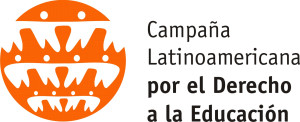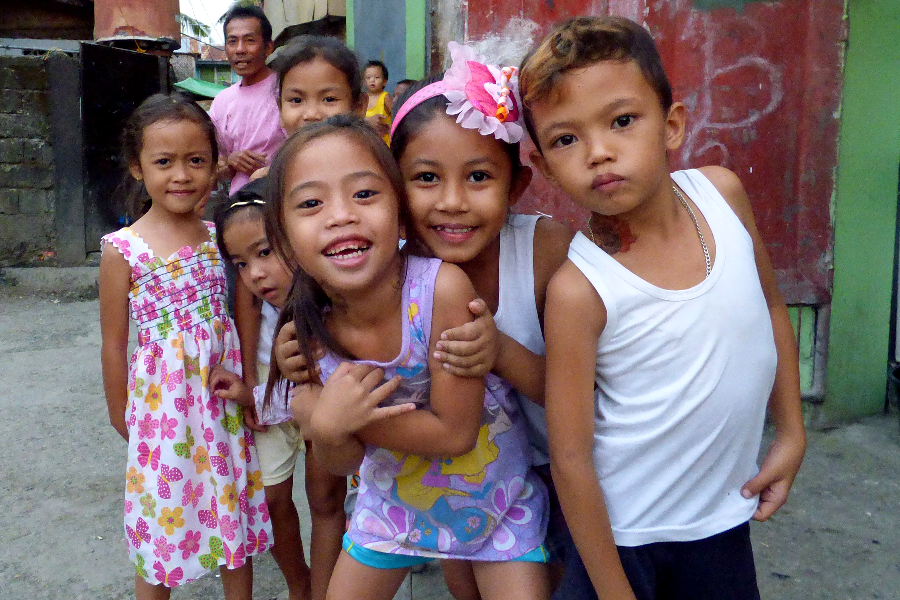
“There is a lack of specific indications on how to achieve the human right to early childhood education”
May 15, 2020¨The Right to Early Childhood Care and Education in Latin America and the Caribbean in the Context of Global, Environmental and Social Challenges.¨ was the title of a virtual panel carried out by the Latin American Campaign for the Right to Education (CLADE), in partnership with World Organization for Early Childhood Education (OMEP), and EDUCO, within the 64th Annual Conference of the Comparative & International Education Society (CIES).
In order to analyze the situation of the right to early childhood care and education in Latin America and the Caribbean, the event was held on March 25th, and included the participation of: Peter Moss, Professor at the Institute of Education from the University of London, and expert with a recognized track record in the field of early childhood education; Mercedes Mayol Lassalle, World President of OMEP; Madeleine Zúñiga, coordinator of the Peruvian Campaign for the Right to Education (CPDE); Vernor Muñoz, director of Policy and Advocacy of the Global Campaign for Education (CME); and Camilla Croso, general coordinator of CLADE, who participated as moderator.
Below you can read the reflections and perspectives that were highlighted in the panel:
Another kind of policies for Early Childhood Care and Education are possible
According to Peter Moss, the global hegemony of neoliberalism and the fact that early childhood care and education (ECCE) have become a political priority worldwide, have led to the consideration of this stage of life as an efficient means of maximizing “human capital”.
“This can be seen in particular in a dominant narrative that has driven national and global policy making in ECCE, a narrative that is instrumental and economistic in rationality and adopts technical practice as first practice: it is a narrative that I have termed ¨the story of quality and high returns ”, he stressed. ¨ In this way that the story goes, early childhood care and education will ensure individual and national success in an increasingly cutthroat global market place, and everyone lives happily ever after¨, he added.
“Those of us in the early childhood field need to be able to understand and relate to transformative ideas emerging in other fields including economy, democracy and environment.”
According to the researcher, this instrumental and economistic perspective is not only present in early childhood care and education, but it cuts across the entire educational field. ¨We also have to take into account the existence of a model of economic development that seeks to reduce the very diverse social and cultural phenomenon such as education to issues of mercantile efficiency or economic growth¨, he pointed out.
He also added that the construction of another perspective of education and care in early childhood, one that is not oriented towards the search of high returns, must be based on democratic political decisions for education, in conjunction with other policies. “It should be connected, entangled with, a larger process involving education as a whole, and indeed the struggle for a future that is built on democracy, social justice, solidarity and sustainability”.
He also affirmed that professionals and thinkers in the field of early childhood should be able to understand and relate to transformative ideas that arise from other fields, beyond education, including economy, democracy and the environment. ¨ While those working on those broad subjects need to be aware of what early childhood, and indeed all education, could contribute to them. ¨
Privilege versus Human Right
¨ Despite the powerful definition of children as holders of rights, enshrined in United Nations` Convention of the Rights of the Child, and the valuable guidelines on the Right to Education, there still is a lack of specific indications on how the human right to education is achieved in early childhood.¨ commented Mercedes Mayol Lassalle, during her intervention.
“Despite the expansion in enrollment, inequality in terms of access persists because households with high economic level are 30% points above the access values of 5 year old children from the poorest households.”
For OMEP President, there are important challenges in terms of the effective implementation of comprehensive and intersectoral approaches to the rights of boys and girls in Latin America and the Caribbean. Inequality in terms of access to education is another challenge in the region, which is confirmed by, for example, the enormous gap in access that exists between children over three years of age and children from birth to three years of age. For this last age group State coverage is very restricted, forcing families to pay for these services.
“Despite the expansion in enrollment, inequality in terms of access persists because households with low economic level are 30% points above the access values of 5 year old children from the poorest households.” she added.
During her presentation, Mercedes analyzed the conclusions of CLADE´s research: ¨The Right to Early Childhood Care and Education: Perspectives from Latin America and the Caribbean¨.
Another important aspect that she highlighted is that the offer of free and compulsory early childhood education is still limited in the region. “International agreements, particularly the Education 2030 Agenda establishes compulsory education at least for 1 year before and attending primary school, and in many countries of the region it has been extended to two or three years before primary school.¨ explained Mercedes Lassalle.
She concluded by saying that, unfortunately, in the region, ¨Early Childhood Care and Education is a privilege for some children, more than a human right for all, particularly from birth up to 3 years of age¨.
Challenges of Early Childhood Care and Education in Peru
In her presentation, Madeleine Zúñiga took us on a historical tour on public policies for early childhood care and education in Peru, from the experience of the “Wawa Wasi” Centers (House of Children, in Quechua), established during the last years of the decade of the 1960s in the southern region of the Peruvian Andes, to the promulgation of the General Education Law Nº19326 in1972, and up to the current challenges they are facing.
“Diversity should not be the problem, but it is the source of great social inequities, that result from the shameful discrimination still ingrained in our society. ¨
For the coordinator of the Peruvian Campaign, the first and perhaps most difficult of the current challenges is the need to overcome the fragmentation of early childhood education by age range, this due to the fact that the responsibility for the administering of policies aimed at early childhood is distributed among three Ministries: Ministry of Development and Social Inclusion (MIDIS), Ministry of Education (MINEDU) and Ministry of Women and Vulnerable Populations (MIMPV), according to the different ages and social needs of children in the country.
The complex diversity of the population in terms of socioeconomic levels, geographic location, cultural and ethnolinguistic diversity, as well as inclusion and equity, represents another permanent challenge. “Diversity should not be the problem, but it is the source of great social inequities, that result from the shameful discrimination still ingrained in our society. These inequities are easy to identify not only in access to services but also in the quality of the services, which leads us to affirm that education continues to be a privilege rather than a universal human right,” she affirmed.The educator and activist also emphasized on the need to improve the quality of all public early childhood care and education and preschool educational programs, as well as to ensure data and evaluation on the quality and relevance of these policies, together with adequate and contextualized teacher training for this stage of life.
¨For them to achieve an optimal performance the initial training of teachers under a human rights approach is urgent. Early childhood deserves attention from professionals whose performance is based on the valuable and meaningful articles of the Convention on the Rights of the Child. (…) Training will give teachers the skills to make the educational experience an experience of democracy, solidarity, and learning to live with others” she said.
Educational systems that do not correspond to realities
At the end of the event, Vernor Muñoz participated with his own observations and analyzed the interventions of the panelists. According to CME Director of Policy and Advocacy, the utilitarian vision of early childhood education, and education in general, has been widely criticized by various human rights mechanisms and organizations.
¨It was Katarina Tomasevski who brought back the attention about 20 years ago on how some economists define education as a production of human capital, and classify all human right dimensions just as externalities. And today, 20 years later, we still see how the World Bank and many development agencies still consider people as human capital instead of subjects of rights¨, Muñoz pointed out.
“We can see that the best interest of the child is well defined by the Human Rights international instruments. But in terms of practical application it is always under the interpretation of those who have the power to decide. ¨
For the activist and former UN relator on the Right to Education, the utilitarian and authoritarian approach to education also reveals that current educational systems do not correspond to people’s realities, not even in the case of the few children who manage to enter the educational system. “We can see that the best interest of the child is well defined by the Human Rights international instruments. But in terms of practical application it is always under the interpretation of those who have the power to decide. So again, under a restrictive and utilitarian view the best interest of the child is usually seen as the potential capacity to become a good consumer.” he concluded.
Questions from the audience
After the virtual dialogue, Peter Moss answered two questions from the audience that could not be discussed during the debate. Read his answers:
Early childhood education from 0 to 3 years is a challenge. There are good experiences found in many countries. What is the view on family education?
Peter Moss – I don’t know the background to this question or the conditions of Latin America and the Caribbean countries, So, I can only say what interests me in a UK and, more broadly, a European context.
Much of my work concerns the development of parenting leaves, so parents can take time away from employment when they have a young child; it is very important that this is shared equally by both parents. So I think the aim should be to provide at least 12 months well paid leave, with at least 4 months for fathers only and 4 months for mothers only.
“We should think of families participating in learning communities, which also provide opportunities for building intergenerational solidarities, practicing participatory democracy and respecting diversity”
After this, children should have access, as of right, to good early childhood education. I also think this education should be in multi-purpose, community-based centres – we call them ‘Children’s Centres’ in England – providing a wide range of services for children, their carers and the local community, and based on values of equality, democracy and solidarity: this is the centre as a shared resource, a public space and place of encounter for citizens.
Rather than educating families, we should think of families participating in learning communities, which also provide opportunities for building intergenerational solidarities, practicing participatory democracy and respecting diversity.
Could you please mention some issues that are relevant for researchers’ groups and universities in Early Childhood Care and Education? Some “new” gaps or topics that we have not taken into account?
Peter Moss – Again, I can only say what interests me in a UK and, more broadly, a European context; others would have very different answers.
First, I think there is a need to develop systems of participatory assessment and evaluation that can recognise and value complexity and diversity., with respect to both children and early childhood centres.
Second, I think there is a need for more work on gender in early childhood education, and especially to better understand the continuing highly gendered nature of early childhood workforces and to propose how this might be reformed.
Third, I think there is a need for research on how democracy can be practiced and deepened in early childhood education, to include participation by children, parents and workers.
Last, I think we need to develop more comparative research (between countries), looking both at structures and cultures of early childhood education, and focusing on elaborating and understanding differences.
Below you can find the panel that was broadcasted in English, available with subtitles in Portuguese and Spanish.
powered by Advanced iFrame. Get the Pro version on CodeCanyon.
Access the dialogue with subtitles here
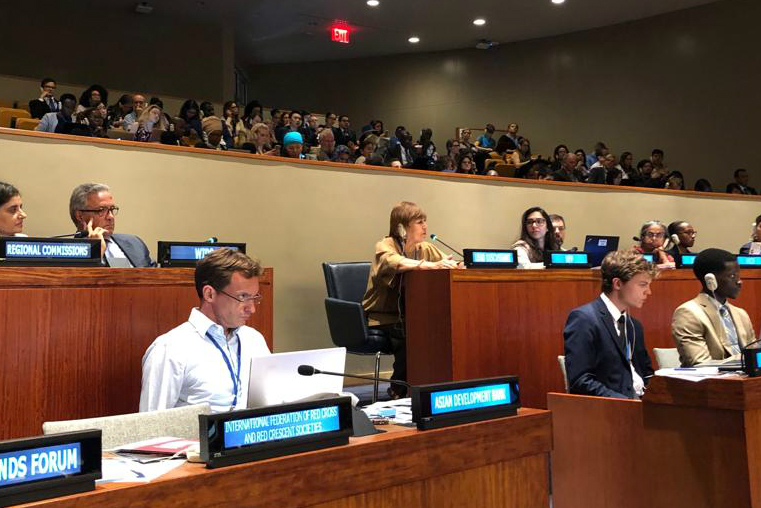
Review of SDG 4: “Quality education must be centered on people and their dignity”
July 10, 2019Yesterday, the review of the Sustainable Development Goal number 4 (SDG 4), about education, was initiated at the United Nations, within the framework of the High Level Political Forum, which takes place until July 18 in New York, USA.
Three hours of debate were dedicated to look at the situation of the right to education worldwide with the participation of representatives from different countries, as well as from different sectors of civil society, among them indigenous people, children and youth, Lesbian, Gay, Bisexual, Trans and Intersex (LGBTI) people and persons with disabilities.
“The diversity of civil society representatives and interventions emphasized an intersectoral perspective of education, which represents a fundamental advance comparing to the debates on the 2030 Agenda that took place in previous years,” said Camilla Croso, general coordinator of the Latin American Campaign for the Right to Education (CLADE), which accompanies the event in New York.
The participation of GCE vice president and coordinator of the Peruvian Campaign for the Right to Education (CPDE), Madeleine Zúñiga, was another highlight of this first panel on SDG 4. In her speech, she pointed out that “education is a powerful instrument to transform lives and, therefore, transform the world; not any education, but one that promotes sustainable development, social justice, truly democratic societies, global citizenship and the culture of peace that the whole world requires.”
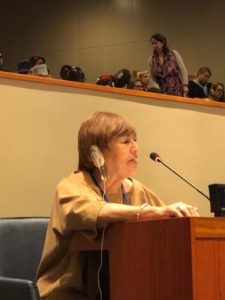
Madeleine Zúñiga emphasized that a quality education must be centered on people and their dignity, assuming the multiple dimensions of diversity to design models and relevant strategies according to the characteristics of different societies. She added that it is fundamental to ensure the right to lifelong education and solid teacher training, within the framework of human rights and comprehensive and muti-sectorial educational attention; as well as bigger and better investment in public education.
“That requires a substantive improvement of tax rules and a strong political will to fight against tax evasion and avoidance, and to achieve tax justice, as well as to face the increasing privatization, an unregulated process that is allowing profit interests in education. Low-cost and low-quality private schools, with poorly paid teachers, not only violate the right to education, but also deepen the inequalities,” she said.
Download the intervention of Madeleine Zúñiga (In Spanish)
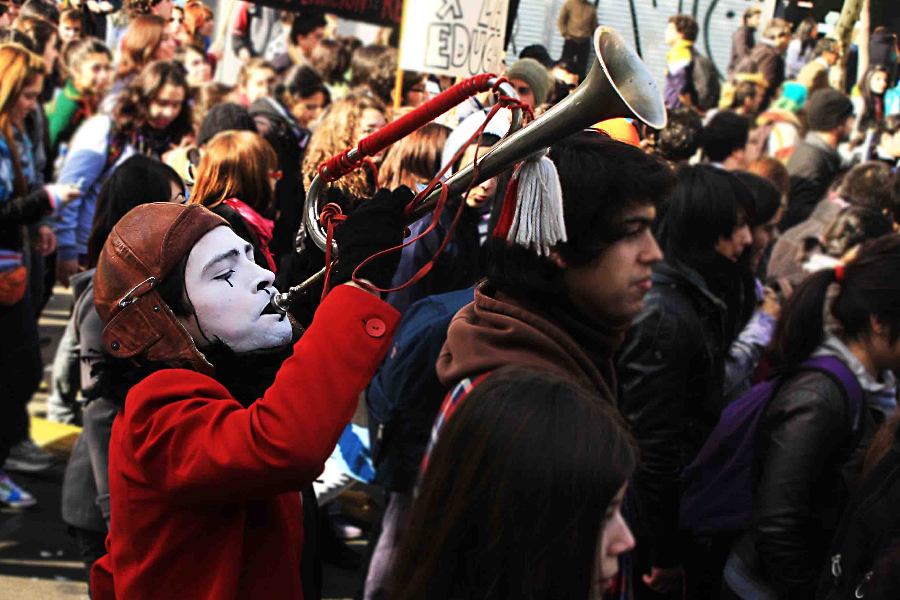
In new publication, CLADE shares experiences, strategies and lessons learned on the fight for the right to education
The Latin American Campaign for the Right to Education (CLADE) launches the publication “Civil Society Advocacy for the Human Right to Education: Stories and Lessons Learned from Latin America and the Caribbean – Volume 3”.
The document is available:
In this volume, members of CLADE tell their experiences on the fight for the right to education: the challenges, advances and lessons learned, the strategies and recommendations that remain for other civil society movements and organizations. It presents cases of advocacy, communication, research and mobilization in 10 countries of Latin America and the Caribbean, as well as 3 regional experiences, driven by CLADE and 2 regional networks that are members of the Campaign: Espacio sin Fronteras and ALER.
The document is the result of a permanent effort by CLADE, to record and provide visibility to the journey of its members in their advocacy and capacity building efforts; and, on the other hand, to promote the reflection on their success and mistakes, in a process of self-evaluation and capacity building by the network.
“In times when we witness a growing democratic weakness in Latin America and the Caribbean, when laws are passed to hinder the right to demonstration and social participation, when social movements, activists and students are persecuted and criminalized, and there are so many restrictions to participation, it is worth showcasing civil society action and its positive impact on education policies,” says CLADE.
The Campaign distributed the publication, during its participation in the High-Level Political Forum, which takes place until July 18 in New York, with an emphasis on reviewing the status of compliance with Sustainable Development Goal 4, related to education.
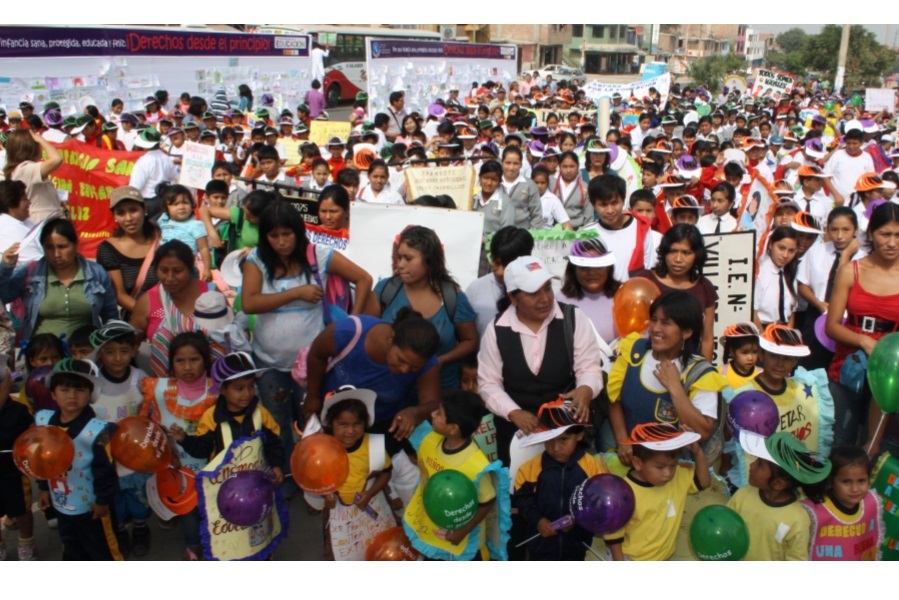
Madeleine Zúñiga: “Great inequality in access and quality is still the challenge of education in Peru”
February 27, 2019Advances, challenges and priority actions in the struggle for the right to education in Peru in 2019 are some of the topics that were discussed in an interview with Madeleine Zúñiga, national coordinator of the Peruvian Campaign for Education.
(more…)





